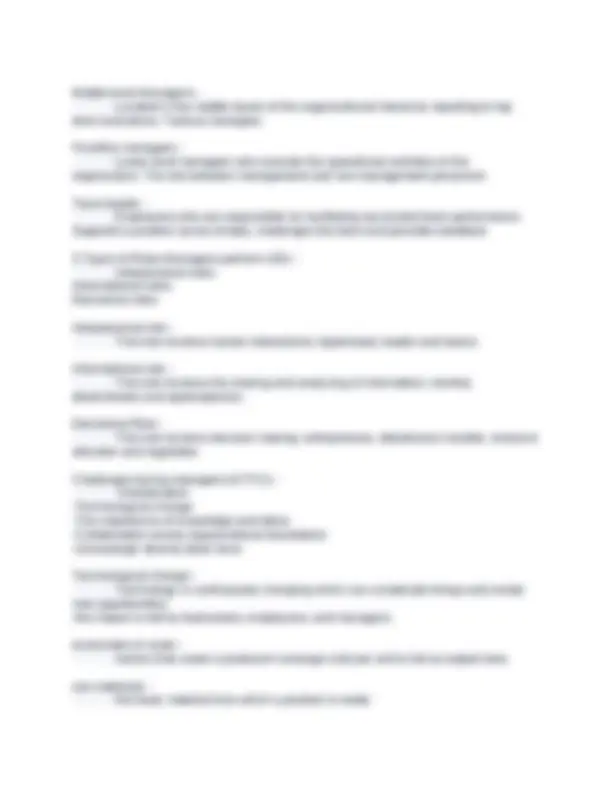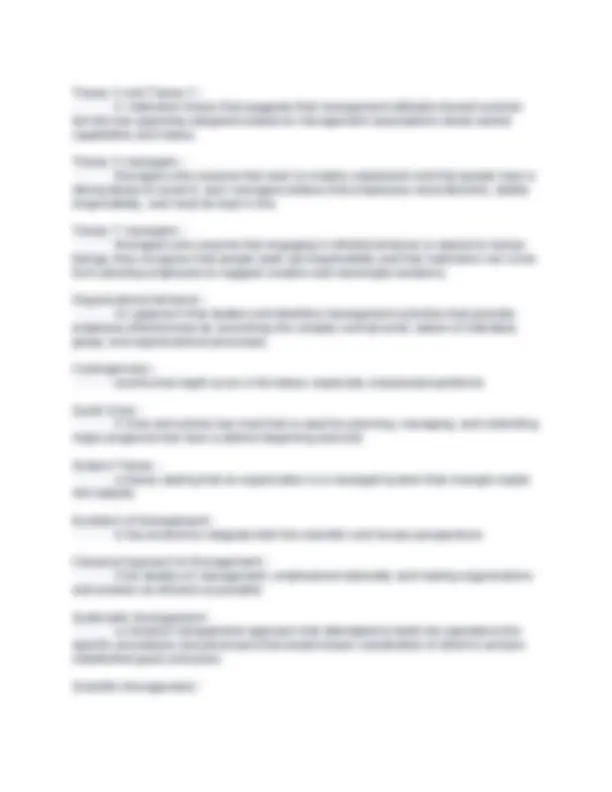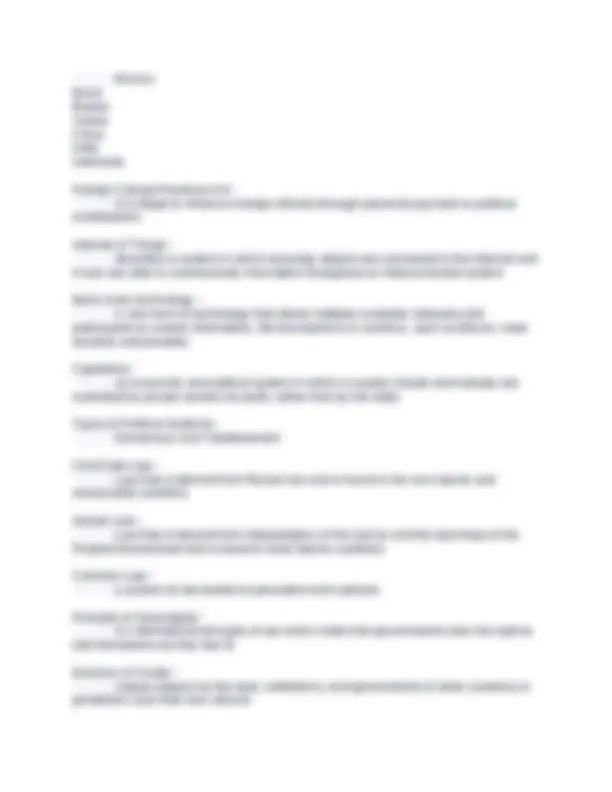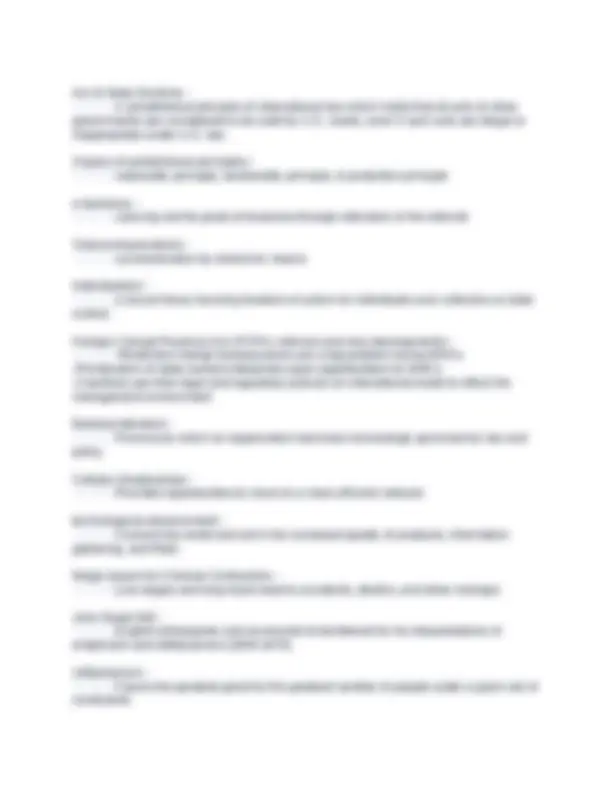








Study with the several resources on Docsity

Earn points by helping other students or get them with a premium plan


Prepare for your exams
Study with the several resources on Docsity

Earn points to download
Earn points by helping other students or get them with a premium plan
Community
Ask the community for help and clear up your study doubts
Discover the best universities in your country according to Docsity users
Free resources
Download our free guides on studying techniques, anxiety management strategies, and thesis advice from Docsity tutors
mgmt 601 organizational behavior exam
Typology: Exams
1 / 11

This page cannot be seen from the preview
Don't miss anything!







Cost Competitiveness - Keeping costs low to achieve profits and be able to offer prices that are attractive to consumers. It requires efficiency. Management - The process of working with people and resources to accomplish organizational goals efficiently and effectively. Efficiency - the ratio of output work to input work Effectiveness - accomplishing tasks that help fulfill organizational objectives Emotional Intelligence - Understanding yourself and managing yourself while also dealing with others effectively Social capital - Goodwill stemming from your social relationships Knowledge management - Set of practices aimed at discovering and harnessing an organizations intellectual resources Sources of Competitive Advantage (CIQSSS) - Cost Competitiveness Innovation Quality Service Speed Sustainability cost competitiveness - Keeping costs low to achieve profits and be able to offer prices that are attractive to consumers. Innovation - -The introduction of new good and services -Creates a new market and/or product to expand sales. Generates a consumer buzz around the new idea. Can extend product life cycle. Quality - The excellence of your product. It refers to attractiveness, lack of defects, reliability, and long-term dependability
Service - the speed and dependability with which an organization delivers what customers want Speed - -fast and timely execution, response, and delivery of results -Speed combined with quality is a measure that a company is operating efficiently Sustainability - -Reducing resources use and waste especially for polluting and non-renewable resources. -Addressing sustainability issues often produce bottom line benefits Collaboration - Requires communication among departments, divisions, or other subunits. Customers can also be collaborators Four Functions of Management (POLC) -
Theory X and Theory Y - A motivation theory that suggests that management attitudes toward workers fall into two opposing categories based on management assumptions about worker capabilities and values. Theory X managers - Managers who assume that work is innately unpleasant and that people have a strong desire to avoid it; such managers believe that employees need direction, dislike responsibility, and must be kept in line. Theory Y managers - Managers who assume that engaging in effortful behavior is natural to human beings; they recognize that people seek out responsibility and that motivation can come from allowing employees to suggest creative and meaningful solutions. Organizational behavior - An approach that studies and identifies management activities that promote employee effectiveness by examining the complex and dynamic nature of individual, group, and organizational processes. Contingencies - events that might occur in the future, especially unexpected problems Gantt Chart - A time and activity bar chart that is used for planning, managing, and controlling major programs that have a distinct beginning and end. System Theory - a theory stating that an organization is a managed system that changes inputs into outputs Evolution of Management - it has evolved to integrate both the scientific and human perspectives Classical Approach to Management - First studies of management, emphasized rationality and making organizations and workers as efficient as possible Systematic Management - a classical management approach that attempted to build into operations the specific procedures and processes that would ensure coordination of effort to achieve established goals and plans Scientific Management -
studying workers to find the most efficient ways of doing things and then teaching people those techniques 14 principles of management by Henri Fayola (DADSCORESUUSIE) - Division of Work Authority Discipline Scalar chain Centralization Order Remuneration Equity Stability and tenure Unity of command Unity of Direction Subordination of individual interest Initiative Esprit de corps Hawthorne effect - the alteration of behavior by the subjects of a study due to their awareness of being observed. Human relations approach to management - A classical management approach that attempted to understand and explain how human psychological and social processes interact with the formal aspect of the work situation to influence performance Abraham Maslow's Hierarchy of Needs - Suggest that humans have five levels of needs and are motivated to satisfy the lowest level need that is unmet. Physiological>Safety>social>esteem> self-actualization Self-actualization is the most advanced need. Fredrick Taylor: Scientific Management - A classical management approach that applied scientific methods to analyze and determine the "one best way" to complete production tasks. bureaucratic approach - Emphasizing a structured, formal network of relationships among specialized positions in the organization. It can be efficient and productive but is not appropriate for every organization. Sociotechnical Systems Theory -
A trade agreement among 11 Pacific Rim countries, including Australia, Brunei, Canada, Chile, Japan, Malaysia, Mexico, New Zealand, Peru, Singapore, and Vietnam. Purchasing Power Parity (PPP) - The amount of money needed in one country to purchase the same goods and services in another country Foreign Direct Investment (FDI) - The amount invested in property, plant, and equipment in another country Flatteners - Defined by Thomas Friedman as events, innovations, tools, and forces that leveled the global playing field. Types of Economies - Established Emerging Developing Important economies in Asia - South Korea Hong Kong Singapore Taiwan Thailand Malaysia Indonesia Vietnam Changes in developed nations - Healthcare spending increases Demand for good declines Working age declined Life expectancy increases Fertility rate decreased G7 economies - United States Canada France Germany United Kingdom Italy Japan E7 Economies -
Mexico Brazil Russia Turkey China India Indonesia Foreign Corrupt Practices Act - It is illegal to influence foreign officials through personal payment or political contributions Internet of Things - describes a system in which everyday objects are connected to the internet and in turn are able to communicate information throughout an interconnected system block chain technology - A new form of technology that allows multiple computer networks and participants to contain information, like transactions or currency, such as Bitcoin, more securely and privately. Capitalism - an economic and political system in which a country's trade and industry are controlled by private owners for profit, rather than by the state. Types of Political Systems - Democracy and Totalitarianism Civil/Code Law - Law that is derived from Roman law and is found in the non-Islamic and nonsocialist countries Islamic Law - Law that is derived from interpretation of the Qur'an and the teachings of the Prophet Muhammad and is found in most Islamic countries Common Law - a system of law based on precedent and customs Principle of Sovereignty - An international principle of law which holds that governments have the right to rule themselves as they see fit. Doctrine of Comity - mutual respect for the laws, institutions, and governments of other countries in jurisdiction over their own citizens
Paris Agreement - Treaty that included nations belonging to the Organization for Economic Cooperation and Development UN Environment Program (UNEP) - A program that monitors environmental conditions and, among other activities, works with the World Meteorological Organization to measure changes in global climate. Wells Fargo (relation to coal-mining companies) - In 2015, at a Paris UN climate summon Morgan Stanley and WF said they would no longer provide financing for coal mining in developed or developing countries after they were pressured by Rainforest Action Network Nongovernmental Organization (NGO) - A nonprofit association or group operating outside of government that advocates and pursues policy objectives. Corporate Governance - the system of governing a company so that the interests of corporate owners and other stakeholders are protected Sustainable Development Goals - 17 goals adopted by the UN in 2015 to reduce disparities between developed and developing countries by 2030 Foreign Corrupt Practices Act (FCPA) - a law that prohibits U.S. corporations from making illegal payments to public officials of foreign governments to obtain business rights or to enhance their business dealings in those countries Corporate Social Responsibility - Closely related to ethics but involves taking action Fair Trade - An organized social movement and market-based approach that aims to help producers in developing countries to obtain living wages for their labor and better trading conditions. Transparent Agents Against Contracting Entities (TRACE) - standard was developed after a review of the practices of 34 companies— applies to business intermediaries. Transparent Agents Against Contracting Entities (TRACE) purpose -
Serve as a formal agreement by a host of industrialized nations to outlaw the practice of bribing foreign government officials OAS Inter-American Convention Against Corruption - Establishes a set of preventative measures, provides for the criminalization of certain acts of corruption Sustainability - meeting the needs of the present without compromising the ability of future generations to meet their own needs Principles of Global Compact - Human Rights Labor Environment Anti-Corruption Regions associated with "crony capitalism" - Russia India Czech Republic Singapore Kantian philosophical traditions - Individuals have responsibilities based on a core set of moral principles that go beyond those of narrow self-interest. Aristotelian Virtue Ethics - Focus on core, individual behaviors and actions and how they express and form individual character. Western vs. Eastern Perspectives - Western philosophy focuses more on ideas and principles. Eastern focuses on behavior and the eternal nature of reality. Germany and Japan women's rights - Still facing a gap when it comes to equal opportunities for women glass ceiling effect - an invisible barrier limiting career advancement of women and minorities multinational corporation (MNC)impact on women's rights - Indulge in massive violation of women's rights with discriminatory policies